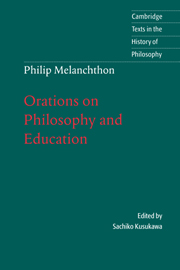Introduction
Published online by Cambridge University Press: 05 June 2012
Summary
Philip Melanchthon is today remembered primarily as the colleague and ally who stood alongside Martin Luther. It is well known that with his humanist skills Melanchthon helped Luther to interpret Greek passages, and assisted him in supporting justification by faith alone as the true message of the Gospel. It was Melanchthon who composed the first systematic treatise of Reformed theology, the Loci communes, which underwent several editions and revisions. He proved to be a formidable exegete, despite not taking a doctorate in divinity. He took part in numerous visitations across German lands to ensure that Luther's message of the Gospel was taught correctly, travelled to diets and colloquies to defend Luther's cause, and undertook various diplomatic missions on behalf of the Electors of Saxony. In 1530 he penned the Augsburg Confession, the first Protestant manifesto. He reformed the arts curriculum of the University of Wittenberg, and revived classical learning in schools and universities across Germany. He wrote textbooks on most of the subjects in the arts curriculum: Latin and Greek grammar, rhetoric, dialectics, moral philosophy and natural philosophy. For subjects on which he did not write, such as geometry, arithmetic, astronomy and astrology, he wrote commendatory prefaces to textbooks by others. For classroom use, he edited and commented upon texts of numerous classical authors such as Cicero, Demosthenes, Virgil, Ovid, Hesiod and Ptolemy. These texts and textbooks were used well into the seventeenth century, and he trained and inspired a vast number of students who in their turn passed on the message of their teacher to the next generation.
- Type
- Chapter
- Information
- Melanchthon: Orations on Philosophy and Education , pp. xi - xxxiPublisher: Cambridge University PressPrint publication year: 1999



